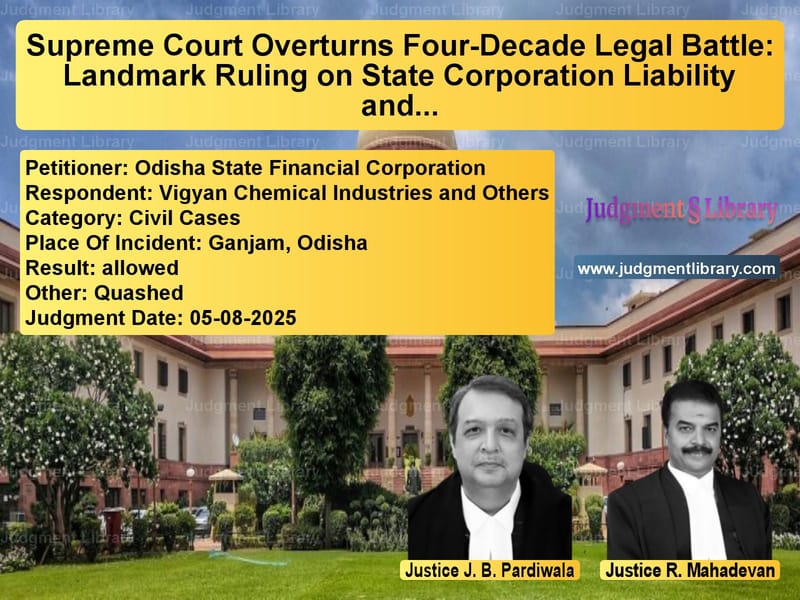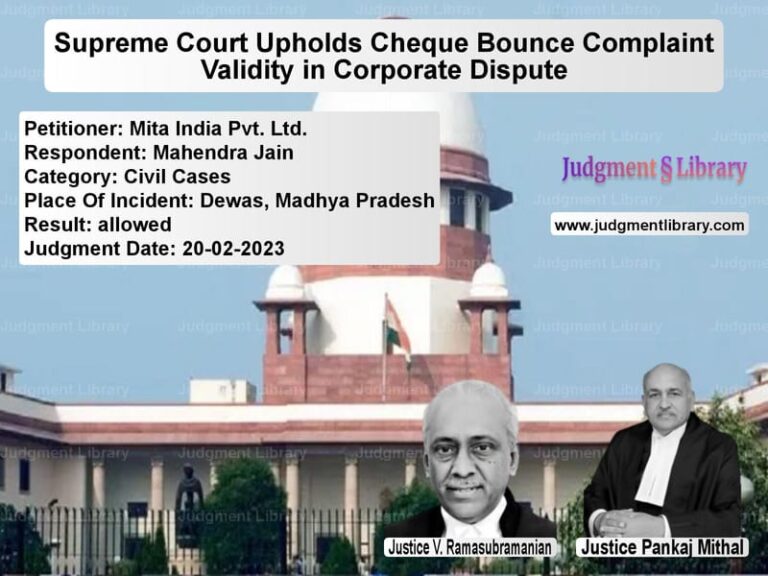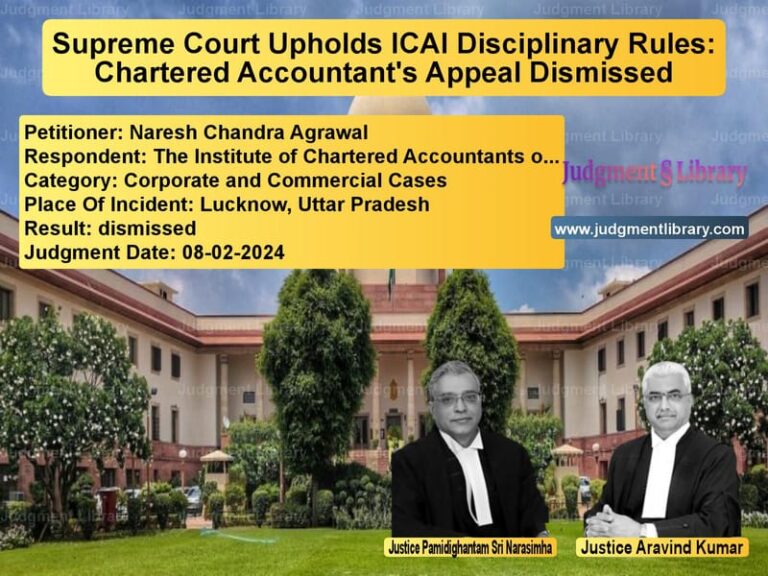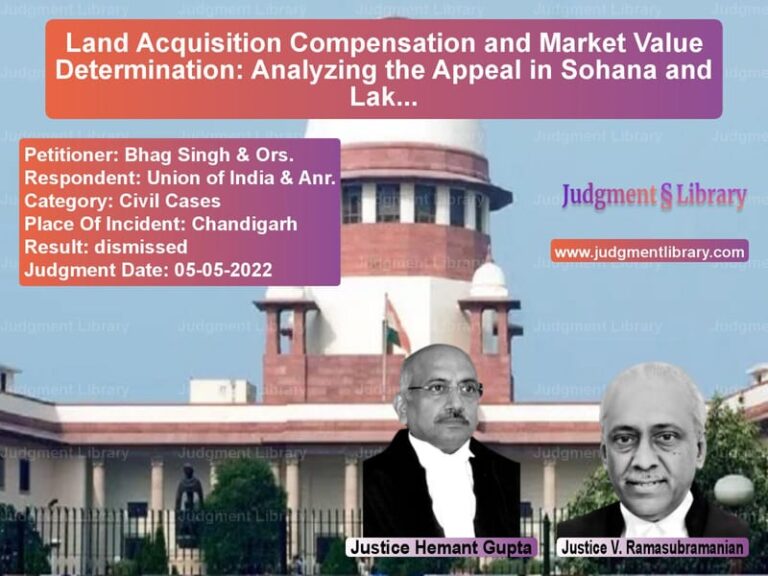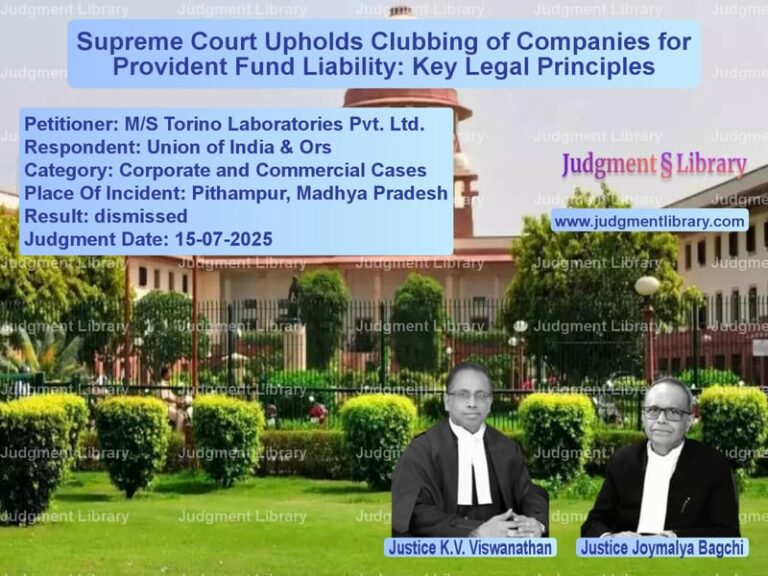Supreme Court Overturns Four-Decade Legal Battle: Landmark Ruling on State Corporation Liability and Interest Calculation
In a landmark judgment that brings closure to a legal battle spanning nearly four decades, the Supreme Court of India delivered a comprehensive ruling on August 5, 2025, setting aside multiple lower court orders that had unjustly burdened a state financial corporation with massive liability. The case, which originated from a simple supply transaction worth Rs. 66,454.65 in 1985, had ballooned into a claim of over Rs. 8.89 crores against the Odisha State Financial Corporation (OSFC). The apex court’s decision not only highlights critical legal principles regarding state corporation liability but also serves as a stark reminder about the importance of procedural compliance and judicial oversight in protecting public funds.
The Origins of the Legal Battle
The dispute began in 1985 when Vigyan Chemical Industries supplied raw materials worth Rs. 66,454.65 to Manorama Chemicals Works Ltd. When Manorama Chemicals defaulted on repayment, OSFC, along with Industrial Promotion & Investment Corporation of Odisha (IPICOL), took possession of the industrial unit in 1987 under Section 29 of the State Financial Corporations Act, 1951. In 1988, Vigyan Chemical filed a recovery suit for Rs. 90,400/- with interest. Crucially, OSFC was not originally a party to this suit. It was only in 1994, nearly six years after the suit was filed, that OSFC was impleaded as a defendant. The trial court eventually decreed the suit in 2001, awarding not just the principal amount but also imposing compound interest at 2% monthly under the Interest on Delayed Payments to Small Scale and Ancillary Industrial Undertakings Act, 1993. This decision set in motion a legal chain reaction that would continue for the next 24 years.
The Supreme Court’s Groundbreaking Legal Analysis
The Supreme Court, comprising Justices J.B. Pardiwala and R. Mahadevan, conducted an exhaustive examination of multiple legal issues that had been overlooked by the lower courts. The court began by addressing the fundamental question of whether the earlier judgment of the Supreme Court in Civil Appeal No. 2073/2010 had conclusively decided all issues in the case. The court invoked the doctrine of ‘sub silentio,’ explaining that “a decision passes sub silentio, in the technical sense that has come to be attached to that phrase, when the particular point of law involved in the decision is not perceived by the court or present to its mind.” The court emphasized that “precedents sub silentio and without argument are of no moment” and that the earlier decision had only addressed the limitation issue while leaving other crucial matters undecided.
The Critical Issue of Section 80 CPC Compliance
One of the most significant findings of the Supreme Court was the complete failure to comply with Section 80 of the Code of Civil Procedure, which mandates a prior notice before instituting a suit against the government or its instrumentalities. The court categorically held that OSFC qualified as a ‘State’ under Article 12 of the Constitution, making the notice requirement mandatory. The court observed that “the object of the Section is the advancement of justice and the securing of public good by avoidance of unnecessary litigation” and that “the requirement of notice under Section 80 is mandatory and must be strictly complied with.” The failure to issue this notice rendered the entire suit against OSFC non-maintainable from its inception.
Misapplication of the Interest on Delayed Payments Act
The Supreme Court delivered a thorough analysis of the misapplication of the Interest on Delayed Payments to Small Scale and Ancillary Industrial Undertakings Act, 1993. The court noted that the supply transaction occurred in 1985, while the Act came into force only in 1992. The court emphasized that “the Act, 1993, without any shadow of doubt, is clearly prospective in nature and governs the incidents of supply and rendering service which happens after its enforcement, i.e., 23.09.1992.” The court further clarified that “the liability to pay under the Act is only on the buyer and cannot be fastened on any other person for a transaction covered under the Act.” Since OSFC was never the buyer in the original transaction, the imposition of compound interest under this Act was completely without legal basis.
Absence of Privity of Contract
The Supreme Court strongly emphasized the complete absence of privity of contract between OSFC and Vigyan Chemical. The court explained that “the liability of a financial corporation is limited only to the extent of the money received from the management or sale of assets of the defaulting concern and lying in its hand after settlement of its dues and creditors’ claims.” The court further clarified that “no claim can be extended to the personal assets or properties of such a corporation” and that OSFC’s role was merely that of a secured creditor exercising its rights under the SFC Act, not as a party to the original supply contract.
Procedural Irregularities and Judicial Oversight
The Supreme Court expressed strong disapproval of the procedural irregularities that had marred the case. The court noted that the trial court had failed to frame essential issues regarding maintainability and jurisdiction despite specific pleas in the written statement. The court also criticized the post-decere application under Section 21 of the Limitation Act, observing that “the trial Court, having already passed the decree, could not have entertained an application under Section 21 of the Limitation Act, 1963, and the post-decree application filed by Respondent No.1 was, therefore, not maintainable.” The court emphasized that once a final decree is passed, the trial court becomes functus officio except for limited purposes.
The Final Ruling and Directions
In its conclusive findings, the Supreme Court declared that “the suit itself was not maintainable against the appellant and the provisions of the repealed Act, 1993 were inapplicable to the present case. Consequently, the execution proceedings to realize the principal with exorbitant interest calculated under the repealed Act, 1993 are unsustainable, and the decree cannot be enforced against the appellant.” The court directed Vigyan Chemical to refund Rs. 2,92,57,559/- that it had already received from OSFC through bank guarantee encashment and attachment proceedings. However, considering the peculiar circumstances, the refund was ordered without interest, with a three-month compliance period.
Broader Implications and Judicial Message
The Supreme Court used this case to deliver a strong message about the responsibilities of public institutions and their legal representatives. The court noted that “Public Institutions – particularly those entrusted with the stewardship of public funds – are expected to conduct themselves in legal proceedings with the highest standards of diligence, responsibility, and accountability.” The court emphasized that “Government counsel, as officers of the Court, bear a dual responsibility: to protect the interest of the State, and to assist the Court in achieving outcomes that are just, lawful and equitable.” This judgment serves as a crucial precedent for protecting state resources from unjust claims and ensuring that procedural safeguards are strictly followed in litigation involving government entities.
Petitioner Name: Odisha State Financial Corporation.Respondent Name: Vigyan Chemical Industries and Others.Judgment By: Justice J. B. Pardiwala, Justice R. Mahadevan.Place Of Incident: Ganjam, Odisha.Judgment Date: 05-08-2025.Result: allowed.
Don’t miss out on the full details! Download the complete judgment in PDF format below and gain valuable insights instantly!
Download Judgment: odisha-state-financi-vs-vigyan-chemical-indu-supreme-court-of-india-judgment-dated-05-08-2025.pdf
Directly Download Judgment: Directly download this Judgment
See all petitions in Contract Disputes
See all petitions in Debt Recovery
See all petitions in Property Disputes
See all petitions in Damages and Compensation
See all petitions in Consumer Rights
See all petitions in Judgment by J.B. Pardiwala
See all petitions in Judgment by R. Mahadevan
See all petitions in allowed
See all petitions in Quashed
See all petitions in supreme court of India judgments August 2025
See all petitions in 2025 judgments
See all posts in Civil Cases Category
See all allowed petitions in Civil Cases Category
See all Dismissed petitions in Civil Cases Category
See all partially allowed petitions in Civil Cases Category

